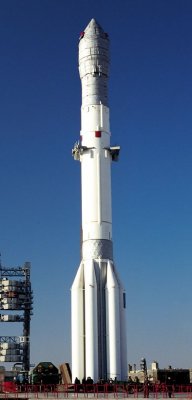Proton (rocket family) facts for kids
The Proton rocket is a powerful space vehicle used to launch satellites and spacecraft into orbit. It's like a giant space taxi! Both businesses and the Russian government use it for their missions. These rockets are built in Moscow at the Khrunichev State Research and Production Space Center. After they are built, they are sent to the Baikonur Cosmodrome in Kazakhstan for launch.
Proton rockets are very strong. They can lift about 22.8 tonnes (that's like 22 small cars!) into Low Earth orbit. They can also carry about 6.3 tonnes to a higher orbit called Geostationary orbit. The Proton rocket has been flying for many years, but it is expected to stop being used before the year 2030.
The Proton Rocket's History
The Proton rocket was first designed a long time ago, not to launch satellites, but as a very large Intercontinental ballistic missile. It was meant to carry heavy payloads over long distances. The very first Proton rocket launched into space in 1965. For many years, its design was kept a secret, and people didn't know much about it until 1986.
Over the years, the Proton rocket became a key part of space exploration. It helped build the Mir space station by launching several of its sections into orbit. It also launched two important parts of the ISS, which is still orbiting Earth today.
See also
 In Spanish: Protón (cohete) para niños
In Spanish: Protón (cohete) para niños


